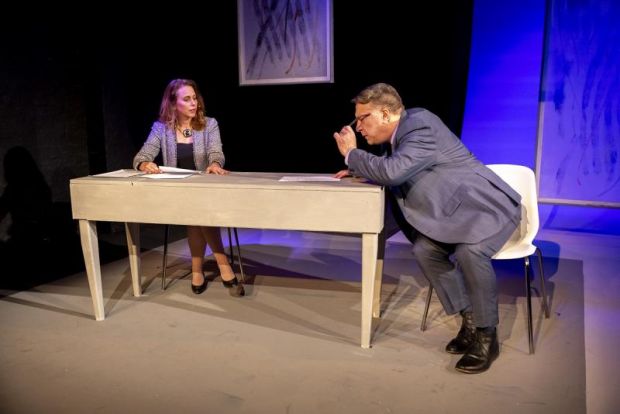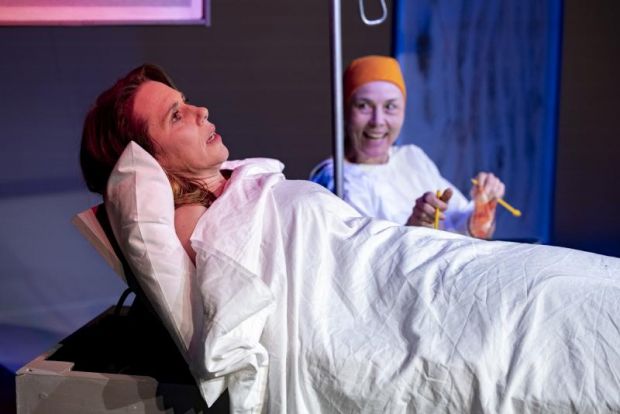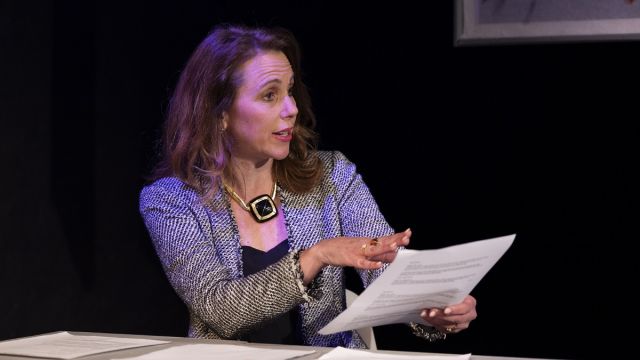Off the Record
“Political and business leaders all over the world seem emboldened more than ever to lie and act corruptly because there is so little accountability.” Chris Aronsten, playwright.
The bravado of those thus “emboldened” – and the difficulty of exposing them – is the basis of Aronsten’s play, but it covers much more than that. Cover-ups, pay-offs, injustice, introspection … all are incorporated in a script that is tightly written and characters that are decidedly real. It is a script that director Jess Davis says reiterates “the importance of stepping back and prioritising oneself …in a world full of injustices, anger and unfairness…”
Davis and her cast take Aronsten’s expertly pared back characters through scenes that are carefully conceived to expose not only corporate corruption and conceit but personal failure, employee vulnerability and the powerlessness of those unable to defend themselves. Davis’s respect for such concise writing is evident in a production that is taut, with the pace determined by crisp, economic dialogue, quick short scenes, and tense action.

The cast sustain that action on a set that is skilfully designed for quick scene changes under atmospheric lighting and sound effects. David Marshal-Martin’s set is wide and spare and bright. Framed by a curved, high screen and translucent artworks suspended at different levels above the stage, it takes the cast smoothly from a sound studio to a green room, a hospital ward, a living room, a bus.
Mehran Mortezaei (lighting), Verica Nikolic (vision) and Scott Gabutto (sound) work creatively together to delineate the scene changes and match and augment the tone and tempo of the action. This is a fine example of a creative production team working closely together to realise a clearly defined vision.
On this set Michela Noonan takes the character of Jenny though a storm of accusation and introspection. Jenny is a TV journalist who exposes the corruption and misbehaviour of a corporate executive, who of course “categorically denies” the allegation. As it happens, Jenny herself is not quite without faults – and the play unravels the over-confident self-assurance of those in the ‘higher zones’ at the same time as it explores the tenuousness and reticence of those of lesser power seeking justice.

Michela Noonan is outstanding as Jenny. She takes the character from smiling celebrity to grim alcoholic in a series of challenging scenes that give her only seconds to move from one persona to the other. Shedding a jacket or picking up a handbag as lighting dims, she crosses the set, deftly taking her character through exchanges that expose her fallibilities and failings … and, eventually, her strength. Noonan takes this vibrant but flawed character through a range of emotional confrontations that lead to wild drunken sprees, near disasters and solemn self-analysis.
On stage for the full ninety minutes of this production, Noonan never loses the pace or energy that Davis sets, nor the depth or intensity of the character Aronsten envisioned.
Joe Clements returns to the New stage as confident, corrupt corporation head, Tony. Tony is not a pleasant character, and Clements gives him all the arrogant, puffy self-importance of the over-confident chauvinist. He defends the accusations of lesser, female employees with haughty denial and smarmy brashness. In private he threatens Jenny with his knowledge of her promiscuity and alcoholism. Clements tells much of his character in actions, in the way he sits, stands, gestures and scoffs dismissively.

Gina Cohen plays Ronni, a patient visiting Jenny in Intensive Care after one of her car accidents. Cohen obviously loves this role, especially Ronni’s quirky humour and down-to-earth egalitarian wisdom. This is a lovely scene and Cohen makes it especially memorable. Later she returns as Carol, Tony’s wealthy but distant wife.
Nadia, played by Belinda Hoare, is Jenny’s AA sponsor, who is as much therapist as support. Hoare’s Nadia keeps the requisite distance in her supportive role, but reaches carefully across the distance with understanding and consideration.
Janine is the brave ‘whistle-blower” who breaks the news of Tony’s misconduct. Suzann James shows all the fear and misgiving one associates with such a role. She is determined, but terrified. Outraged when those she has championed take a settlement. Hoare shows all this in a naïve belief in justice, tempered by anxious hesitancy and, finally, in wide-eyed disbelief.

Chad Traupmann plays Jenny’s husband Peter, a writer, whom Jenny has almost discounted for years. Traupmann gives the role both pathos and tentative power as Peter, initially cowered by Jenny’s condescension gathers the strength to tell her he is leaving her. The character contrast in this short scene is well written – and cleverly directed. Later Traupmann returns to the stage in a short scene that shows his comic timing.
Jess Davis has given this Australian premiere the care and attention it deserves. She has used the set creatively, choreographing scene changes to sustain the pace and match the accelerating tempo of the script. Under her direction the cast moves naturally and believably, ensuring that Aronsten’s messages are clear – and that his characters are portrayed with evocative clarity in a production of which she, her design team and her cast should be justly proud.
Carol Wimmer
Photographer: Bob Seary
Subscribe to our E-Newsletter, buy our latest print edition or find a Performing Arts book at Book Nook.

